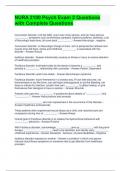NURA 2100 Psych Exam 2 Questions
with Complete Questions
Conversion Disorde: a lot like SSD, even even more serious, and can have serious
__________ symptoms such as blindness, paralysis, balance problems, deafness. Lots
of Neurologic tests done, all come back __________ - Answer-Neurologic , negative
Conversion disorder: no Neurologic change in brain, arm is paralyzed but reflexes and
muscle tone still there, stress and childhood __________ is associated with this
disorder - Answer-Sexual
factitious disorder - Answer-Intentionally causing an illness or injury to receive attention
of healthcare providers
Factitious disorder: motivated solely by the desire to become a __________ and
develop a __________ relationship with a provider - Answer-Patient, Dependent
Factitious Disorder used to be called: - Answer-Munchausen syndrome
Factitious disorder: injure themselves in a sneaky way, Pt can fake seizures, rub
thermometers to act like fever, can self inject anticoagulants to act like bleeding, rub
feces in orifices for infection, scratch their own __________ to delay healing, or give
themselves their allergens to have a reaction. - Answer-Wounds
Patients often get very __________ if questioned about details of " __________" and
"__________" - Answer-Hallucinations and amnesia
__________ __________ are over represented in the occurrence of this disorder. -
Answer-Healthcare professionals
These patients often experienced sexual abuse as a child, only received care and
compassion during time of __________ - Answer-Illness
Overall goal of Factitious disorder is to replace the dysfunctional behaviors with
__________ behaviors - Answer-Positive
With Factitious disorder, acknowledge __________, give up __________ with long term
therapy, __________ __________ need to be identified, and identify early __________
childhood experiences - Answer-Deception , behavior, physical disabilities , Negative
factitious disorder imposed on another - Answer-a condition in which one person
induces injury/illness symptoms on someone else to get attention from healthcare
providers
, This condition is typically a mother who injures __________ to gain attention through
the child's injuries - Answer-Her child
This includes poisoning, seizures, and smothering. It is considered __________
__________! Usually identified in the ER, can also occur through the many tests,
procedures, and medications given throughout this - Answer-Child abuse
Malingering: falsifying illness to gain external benefits like avoiding work, seeking pain
meds, this is not a __________ condition. - Answer-Psychiatric
Difference between malingering and factitious disorder, malingering requires another
__________ other than just being a sick person - Answer-Motivation
Chapter 6: Ethical Principles - Answer-Respect of autonomy, Beneficence,
nonmalificence, justice, fidelity, and veracity
Respect for autonomy- each person has the fundamental right to make ________
decisions about their health care decisions which means we have to get __________
consent - Answer-Voluntary, Informed
Nurse protects autonomy by assessing a persons decisional capacity to act in their own
_______ interest as they see it - Answer-Best
A person loses the ability to be self determining if information about their health
conditions is _______ with others without _________ - Answer-Shared , consent
Beneficence- duty to ______ the patient and community, use knowledge and skills to
help people ________ - Answer-Help, Thrive
Psych exam - Answer-Chapter 33
Somatization is the result of abnormally high levels of ______ responses to ________
situations - Answer-Physiologic , Stressful
_________ discomfort is often more acceptable to express than __________ discomfort
in some cultures - Answer-Physical , Physiological
Disruptions of routine body cycles: - Answer-1- digestion
2- menstruation
3- sleep
Somatic Symptom Disorder (SSD): Diagnosed when a person has significant and
_______ focus on _________ symptoms that cause major distress or problems in their
daily lives - Answer-Persistent, physical




